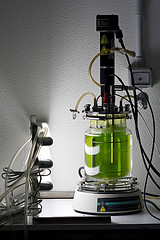
The energy giant BP and Martek Biosciences, a Maryland based company that uses micro algae to produce oil-based nutritional and dietary supplements, signed a Joint Development Agreement (JDA) earlier this month to produce microbial oils for biofuels applications.
Under this agreement, BP will provide the cash — up to $10 million for just the first phase — and Martek will provide the research expertise in algae fermentation technology. The idea is to develop a cost effective method of converting basic sugars derived from biomass into lipids, or microbial oils, with fermentation microorganisms. Chemical and thermocatalytic processes would then convert the oils into various types of biofuels.
The companies estimate that such production would reduce greenhouse gas emissions by 80 – 90% compared to current fossil fuels. Since biomass can be derived from sources such as sugar cane and its waste (bagasse), energy grasses, and woodchips, which can be produced at large scales and in high yields, this technology would also reduce the current reliance of biofuels on the price and availability of vegetable oils and eliminate concerns over cutting into existing food supplies.
The biggest drawback to the current agreement is that Martek does not currently have any algae or related microbes capable of such conversion. Steve Dubin, Martek’s CEO, stated that finding the right organism would take a great deal of work, but finding the perfect one could significantly lower the costs of this new technology.
Each company will retain all intellectual property held previously, and BP will hold the rights for any technology developed under the JDA. Martek will hold an exclusive license for future applications in the nutritional, cosmetic, and pharmaceutical industries.
Photo Credit: kaibara87 at flickr





Fermented fuel?
I love to prepare fermented food and drinks, and would certainly be very interested in learning about the results this people get with the fermentation microorganisms.
We’re car free but I’d love to ride a vehicle running on fermented fuel. If it´s good for your stomach, it must be good for your car 😉
Fermented fuel?
I love to prepare fermented food and drinks, and would certainly be very interested in learning about the results this people get with the fermentation microorganisms.
We’re car free but I’d love to ride a vehicle running on fermented fuel. If it´s good for your stomach, it must be good for your car 😉